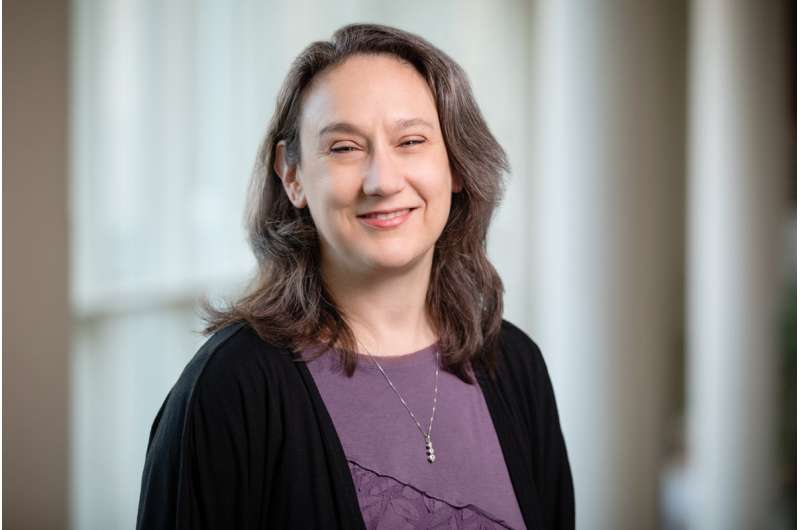News reports and social media campaigns such as #MeToo are heightening awareness of sexual misconduct and helping survivors find their voices, according to University of Illinois educational psychologist Anita Hund. Credit: L. Brian Stauffer
University of Illinois educational psychology professor Anita Hund has a counseling practice and her research interests include sexual trauma. Hund spoke recently with News Bureau education editor Sharita Forrest about current attitudes toward sexual misconduct in the U.S.
Every passing week seems to bring new allegations of sexual misconduct involving famous men. Does this mark a turning point in American society's attitudes toward sexual harassment and sexual assault – and holding perpetrators accountable?
I think it partially represents a breaking point in women's willingness to stand by and watch the minimization and denial of sexual violence. It became clear that survivors and women have been silent for too long.
A large trigger was watching the election of a man as U.S. president who had very few qualifications but beat a very qualified woman – despite repeated accusations of sexual assault and sexual harassment, and a recording of his endorsing sexual violence. I think this was a wake-up call for many people. The election left many people feeling helpless and powerless. In response, people have found power where they could – through their voices.
Social media enabled the rapid spread of information and promoted validation and support for survivors in a way that wasn't possible before. The #MeToo movement is making the widespread nature of sexual violence obvious while also destigmatizing survivors. It is starting dialogue over what true apologies and accountability should look like.
People are only held accountable in communities where survivors are believed and valued. It seems that some people are being held accountable while others remain protected. It is meaningful, regardless, that people are being held accountable.
It's difficult for some people to understand why survivors such as Beverly Young Nelson, who alleged that former U.S. Senate candidate Roy Moore sexually assaulted her in 1977, don't come forward immediately. When a significant amount of time elapses, are such allegations less credible?
While the amount of time that elapsed detracts from the accuser's credibility in the eyes of the public, I do not think it says anything about the truth. Often, people do not feel they can come forward until they are less vulnerable and have more resources.
It is more common for survivors to not go to the police, to tell no one. Almost every survivor I have worked with has blamed themselves, at least partially, for their own victimization.
Additionally, others tend to blame survivors – citing their wardrobe, their behavior, their location for the violence – rather than the perpetrator. I have worked with young women whose family members denied their experiences out of what was clearly family members' own need to think this could not happen in their community, school or home.
A common theme among the allegations involving famous people is power disparities. Are power and status disparities significant factors in sexual crimes involving people who aren't famous?
There is a long history of the justice system not believing survivors or insufficiently holding perpetrators accountable, particularly if the perpetrator has some power.
It is not uncommon for perpetrators to choose victims who are less likely to be believed – children, people with less status or with disabilities or mental illness. Nor is it uncommon for perpetrators to threaten people they victimize. Some of my clients' perpetrators have threatened them with an array of consequences, including physical violence against them or their loved ones, threats to tell their secrets or to get them fired.
The survivors of Roy Moore described his assertion that they would not be believed. His victims were teenagers, who are more vulnerable to being blamed or to threats to tell their parents. Teens have few independent resources and are likely to keep the secret until they have good support for coming forward.
Does the justice system contribute to the culture of secrecy involving sexual crimes?
I have heartbreaking stories of survivors being told that there was not enough evidence that they did not give consent, including survivors of gang rape and those with clear physical injuries. Sometimes, these people had to continue to see the perpetrator because they were not afforded any protection after reporting the incidents.
Legal proceedings are usually retraumatizing for survivors, forcing them to defend their stories repeatedly and questioning their morality and credibility. I have witnessed harrowing legal proceedings where the defense strategy was to make the survivor look mentally ill, promiscuous or compromised in some way.
Often, there is reasonable doubt because it is called a case of "he said, she said." Without other proof, a woman is unlikely to step forward.
Education secretary Betsy DeVos rescinded the campus sexual assault regulations enforced by the Obama administration. Was the mandate to enforce Title IX violating the rights of young men accused of sexual misconduct, as DeVos' agency claimed?
DeVos' claim is that people accused of perpetration are not given due process. Most schools do indeed have some sort of due process for sexual assault and harassment charges.
The question is: What is more problematic and more common – false accusations or sexual assault? Statistics clearly show that sexual assault is much more common.
All Title IX does is require that schools respond to hostile educational environments. Negative response to Title IX may be due to the fact that people become upset when they are held accountable for things that they once were able to do.
Provided by University of Illinois at Urbana-Champaign




















